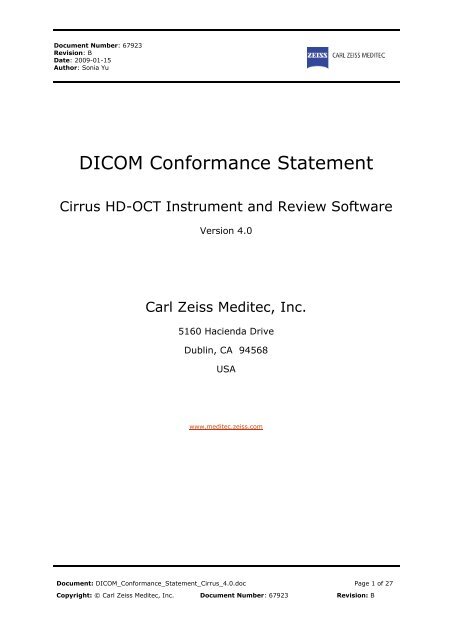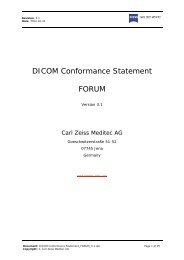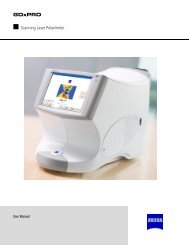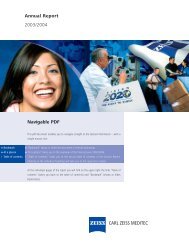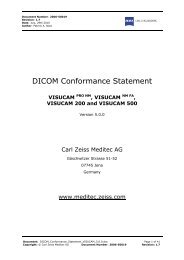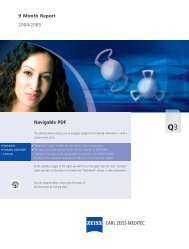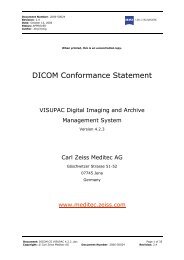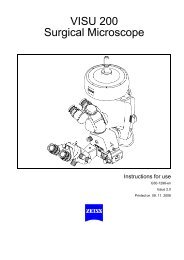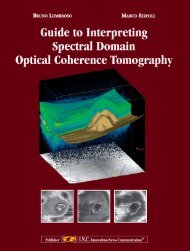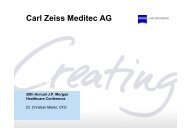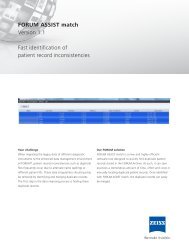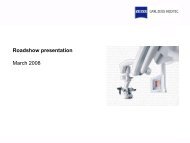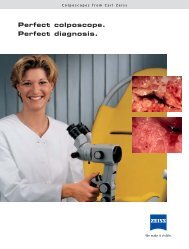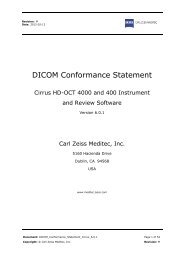Cirrus HD-OCT version 4.0 - Carl Zeiss Meditec AG
Cirrus HD-OCT version 4.0 - Carl Zeiss Meditec AG
Cirrus HD-OCT version 4.0 - Carl Zeiss Meditec AG
You also want an ePaper? Increase the reach of your titles
YUMPU automatically turns print PDFs into web optimized ePapers that Google loves.
Document Number: 67923<br />
Revision: B<br />
Date: 2009-01-15<br />
Author: Sonia Yu<br />
DICOM Conformance Statement<br />
<strong>Cirrus</strong> <strong>HD</strong>-<strong>OCT</strong> Instrument and Review Software<br />
Version <strong>4.0</strong><br />
<strong>Carl</strong> <strong>Zeiss</strong> <strong>Meditec</strong>, Inc.<br />
5160 Hacienda Drive<br />
Dublin, CA 94568<br />
USA<br />
www.meditec.zeiss.com<br />
Document: DICOM_Conformance_Statement_<strong>Cirrus</strong>_<strong>4.0</strong>.doc Page 1 of 27<br />
Copyright: © <strong>Carl</strong> <strong>Zeiss</strong> <strong>Meditec</strong>, Inc. Document Number: 67923 Revision: B
1 Conformance Statement Overview<br />
This document is structured as suggested in the DICOM Standard (PS 3.2, 2008).<br />
SOP Classes User of Service<br />
(SCU)<br />
Transfer<br />
Encapsulated PDF Storage Yes No<br />
Workflow Management<br />
Modality Worklist IM - FIND Yes No<br />
<strong>Cirrus</strong> <strong>HD</strong>-<strong>OCT</strong> does not support Media Interchange.<br />
Provider of Service<br />
(SCP)<br />
Document: DICOM_Conformance_Statement_<strong>Cirrus</strong>_<strong>4.0</strong>.doc Page 2 of 27<br />
Copyright: © <strong>Carl</strong> <strong>Zeiss</strong> <strong>Meditec</strong>, Inc. Document Number: 67923 Revision: B
2 Table of Contents<br />
1 Conformance Statement Overview ........................................................................................................2<br />
2 Table of Contents................................................................................................................................3<br />
3 Introduction .......................................................................................................................................5<br />
3.1 Revision History...........................................................................................................................5<br />
3.2 Audience.....................................................................................................................................5<br />
3.3 Remarks .....................................................................................................................................5<br />
3.4 Definitions and Terms...................................................................................................................5<br />
3.5 Abbreviations ..............................................................................................................................6<br />
3.6 References ..................................................................................................................................7<br />
4 Networking ........................................................................................................................................8<br />
4.1 Implementation Model ..................................................................................................................8<br />
4.1.1 Application Data Flow ............................................................................................................8<br />
4.1.2 Functional Definition of AEs ....................................................................................................8<br />
4.1.2.1 Functional Definition of <strong>Cirrus</strong> <strong>HD</strong>-<strong>OCT</strong> AE .........................................................................8<br />
4.1.3 Sequencing of Real-World Activities.........................................................................................8<br />
4.1.3.1 Scheduled case..............................................................................................................8<br />
4.1.3.2 Unscheduled case ..........................................................................................................9<br />
4.2 AE Specifications .........................................................................................................................9<br />
4.2.1 <strong>Cirrus</strong> <strong>HD</strong>-<strong>OCT</strong> Application Entity Specification..........................................................................9<br />
4.2.1.1 SOP Classes ..................................................................................................................9<br />
4.2.1.2 Associations Policies ..................................................................................................... 10<br />
4.2.1.2.1 General................................................................................................................ 10<br />
4.2.1.2.2 Number of Associations.......................................................................................... 10<br />
4.2.1.2.3 Asynchronous Nature............................................................................................. 10<br />
4.2.1.2.4 Implementation Identifying Information................................................................... 10<br />
4.2.1.3 Association Initiation Policy ...........................................................................................10<br />
4.2.1.3.1 Activity – Verify Communication.............................................................................. 10<br />
4.2.1.3.2 Activity – Query Modality Worklist ........................................................................... 12<br />
4.2.1.3.3 Activity – Create and store evidence reports............................................................. 17<br />
4.2.1.4 Association Acceptance Policy ........................................................................................ 18<br />
4.2.1.4.1 Activity – Verify Communication.............................................................................. 18<br />
4.3 Network Interfaces..................................................................................................................... 18<br />
4.3.1 Physical Network Interface ................................................................................................... 18<br />
4.3.2 Additional Protocols............................................................................................................. 18<br />
4.4 Configuration ............................................................................................................................ 19<br />
4.4.1 AE Title/Presentation Address Mapping .................................................................................. 19<br />
4.4.1.1 Local AE Titles ............................................................................................................. 19<br />
4.4.1.2 Remote AE Titles.......................................................................................................... 19<br />
4.4.2 Parameters ........................................................................................................................ 19<br />
4.4.2.1 General Parameters......................................................................................................19<br />
4.4.2.2 Verification SCU Parameters .......................................................................................... 19<br />
4.4.2.3 Modality Worklist SCU Parameters.................................................................................. 19<br />
4.4.2.4 Storage SCU Parameters............................................................................................... 19<br />
4.4.2.5 Verification SCP Parameters .......................................................................................... 19<br />
5 Media Interchange ............................................................................................................................ 20<br />
6 Support Of Character Sets ................................................................................................................. 21<br />
7 Security........................................................................................................................................... 22<br />
8 Annexes .......................................................................................................................................... 23<br />
8.1 IOD Contents ............................................................................................................................ 23<br />
8.1.1 Created SOP Instance(s)...................................................................................................... 23<br />
8.1.1.1 Encapsulated PDF IOD .................................................................................................. 23<br />
Document: DICOM_Conformance_Statement_<strong>Cirrus</strong>_<strong>4.0</strong>.doc Page 3 of 27<br />
Copyright: © <strong>Carl</strong> <strong>Zeiss</strong> <strong>Meditec</strong>, Inc. Document Number: 67923 Revision: B
8.1.2 Usage Of Attributes From Received IODs ............................................................................... 26<br />
8.1.3 Attribute Mapping ............................................................................................................... 26<br />
8.1.4 Coerced/Modified Files ......................................................................................................... 26<br />
8.2 Data Dictionary of Private Attributes............................................................................................. 27<br />
8.3 Coded Terminology And Templates .............................................................................................. 27<br />
8.4 Greyscale Image Consistency ...................................................................................................... 27<br />
8.5 Standard Extended / Specialized/ Private SOP Classes.................................................................... 27<br />
8.6 Private Transfer Syntaxes ........................................................................................................... 27<br />
Document: DICOM_Conformance_Statement_<strong>Cirrus</strong>_<strong>4.0</strong>.doc Page 4 of 27<br />
Copyright: © <strong>Carl</strong> <strong>Zeiss</strong> <strong>Meditec</strong>, Inc. Document Number: 67923 Revision: B
3.1 Revision History<br />
3.2 Audience<br />
Document<br />
Version<br />
3 Introduction<br />
Author Date<br />
A Alex Brandao 2008-03-26<br />
B Sonia Yu 2008-01-15<br />
This document is intended for hospital staff, health system integrators, software designers or implementers.<br />
The reader should have a basic understanding of DICOM.<br />
3.3 Remarks<br />
If another device matches this conformance statement based on the comparison with its own conformance<br />
statement, there is a chance, but no guarantee, that they interoperate. DICOM deals only with communication;<br />
it does not specify what is needed for certain applications to run on a device.<br />
3.4 Definitions and Terms<br />
Informal definitions are provided for the following terms used in this Conformance Statement.<br />
The DICOM Standard is the authoritative source for formal definitions of these terms.<br />
Abstract Syntax<br />
the information agreed to be exchanged between applications, generally equivalent to a Service/Object<br />
Pair (SOP) Class.<br />
Examples: Verification SOP Class, Modality Worklist Information Model Find SOP Class, and Computed<br />
Radiography Image Storage SOP Class.<br />
Application Entity (AE)<br />
an end point of a DICOM information exchange, including the DICOM network or media interface<br />
software; i.e., the software that sends or receives DICOM information objects or messages. A single<br />
device may have multiple Application Entities.<br />
Application Entity Title<br />
the externally known name of an Application Entity, used to identify a DICOM application to other<br />
DICOM applications on the network.<br />
Application Context<br />
the specification of the type of communication used between Application Entities.<br />
Example: DICOM network protocol.<br />
Association<br />
A network communication channel set up between Application Entities.<br />
Attribute<br />
a unit of information in an object definition; a data element identified by a tag. The information may be<br />
a complex data structure (Sequence) composed of lower level data elements.<br />
Examples: Patient ID (0010,0020), Accession Number (0008,0050), Photometric Interpretation<br />
(0028,0004) and Procedure Code Sequence (0008,1032).<br />
Information Object Definition (IOD)<br />
the specified set of Attributes that comprise a type of data object; does not represent a specific<br />
instance of the data object, but rather a class of similar data objects that have the same properties.<br />
The Attributes may be specified as Mandatory (Type 1), Required but possibly unknown (Type 2), or<br />
Optional (Type 3), and there may be conditions associated with the use of an Attribute (Types 1C and<br />
2C).<br />
Examples: MR Image IOD, CT Image IOD, Print Job IOD.<br />
Joint Photographic Experts Group (JPEG)<br />
a set of standardized image compression techniques, available for use by DICOM applications.<br />
Media Application Profile<br />
the specification of DICOM information objects and encoding exchanged on removable media (e.g.,<br />
CDs)<br />
Document: DICOM_Conformance_Statement_<strong>Cirrus</strong>_<strong>4.0</strong>.doc Page 5 of 27<br />
Copyright: © <strong>Carl</strong> <strong>Zeiss</strong> <strong>Meditec</strong>, Inc. Document Number: 67923 Revision: B
Module<br />
a set of Attributes within an Information Object Definition that are logically related to each other.<br />
Example: Patient Module includes Patient Name, Patient ID, Patient Birth Date, and Patient Sex.<br />
Negotiation<br />
first phase of Association establishment that allows Application Entities to agree on the types of data to<br />
be exchanged and how that data will be encoded.<br />
Presentation Context<br />
the set of DICOM network services used over an Association, as negotiated between Application<br />
Entities; includes Abstract Syntaxes and Transfer Syntaxes.<br />
Protocol Data Unit (PDU)<br />
a packet (piece) of a DICOM message sent across the network. Devices must specify the maximum<br />
size packet they can receive for DICOM messages.<br />
Query Key<br />
an input value for a query process. Query Keys denote the set of DICOM tags that are sent from the<br />
SCU to SCP and thus control the query result.<br />
Security Profile<br />
a set of mechanisms, such as encryption, user authentication, or digital signatures, used by an<br />
Application Entity to ensure confidentiality, integrity, and/or availability of exchanged DICOM data<br />
Service Class Provider (SCP)<br />
role of an Application Entity that provides a DICOM network service; typically, a server that performs<br />
operations requested by another Application Entity (Service Class User).<br />
Examples: Picture Archiving and Communication System (image storage SCP, and image<br />
query/retrieve SCP), Radiology Information System (modality worklist SCP).<br />
Service Class User (SCU)<br />
role of an Application Entity that uses a DICOM network service; typically, a client.<br />
Examples: imaging modality (image storage SCU, and modality worklist SCU), imaging workstation<br />
(image query/retrieve SCU)<br />
Service/Object Pair (SOP) Class<br />
the specification of the network or media transfer (service) of a particular type of data (object); the<br />
fundamental unit of DICOM interoperability specification.<br />
Examples: Ultrasound Image Storage Service, Basic Grayscale Print Management.<br />
Service/Object Pair (SOP) Instance<br />
an information object; a specific occurrence of information exchanged in a SOP Class.<br />
Examples: a specific x-ray image.<br />
Tag<br />
a 32-bit identifier for a data element, represented as a pair of four digit hexadecimal numbers, the<br />
“group” and the “element”. If the “group” number is odd, the tag is for a private (manufacturerspecific)<br />
data element.<br />
Examples: (0010,0020) [Patient ID], (07FE,0010) [Pixel Data], (0019,0210) [private data element]<br />
Transfer Syntax<br />
the encoding used for exchange of DICOM information objects and messages.<br />
Examples: JPEG compressed (images), little endian explicit value representation.<br />
Unique Identifier (UID)<br />
a globally unique “dotted decimal” string that identifies a specific object or a class of objects; an ISO-<br />
8824 Object Identifier.<br />
Examples: Study Instance UID, SOP Class UID, SOP Instance UID.<br />
Value Representation (VR)<br />
the format type of an individual DICOM data element, such as text, an integer, a person’s name, or a<br />
code. DICOM information objects can be transmitted with either explicit identification of the type of<br />
each data element (Explicit VR), or without explicit identification (Implicit VR); with Implicit VR, the<br />
receiving application must use a DICOM data dictionary to look up the format of each data element.<br />
3.5 Abbreviations<br />
Abbreviation Definition<br />
AE Application Entity<br />
AET Application Entity Title<br />
DICOM Digital Imaging and Communications in<br />
Medicine<br />
ILE Implicit Little Endian<br />
Document: DICOM_Conformance_Statement_<strong>Cirrus</strong>_<strong>4.0</strong>.doc Page 6 of 27<br />
Copyright: © <strong>Carl</strong> <strong>Zeiss</strong> <strong>Meditec</strong>, Inc. Document Number: 67923 Revision: B
3.6 References<br />
ELE Explicit Little Endian<br />
IOD Information Object Definition<br />
JPG-1 JPEG Coding Process 1 transfer syntax; JPEG<br />
Baseline; ISO 10918-1<br />
J2K JPEG 2000 Image Compression<br />
J2K-LO JPEG 2000 Image Compression<br />
(Lossless Only)<br />
MWL Modality Work List<br />
MPG2 Motion Picture Expert Group 2; Abbreviation<br />
and synonym for video encoding and<br />
compression transfer syntax.<br />
SCP Service Class Provider<br />
SCU Service Class User<br />
SOP Service Object Pair, union of a specific DICOM<br />
service and related IOD.<br />
TCP/IP Transmission Control Protocol / Internet<br />
Protocol<br />
UID Unique Identifier<br />
IM Information Model<br />
Digital Imaging and Communications in Medicine (DICOM), NEMA PS 3.1-3.18, 2008<br />
Document: DICOM_Conformance_Statement_<strong>Cirrus</strong>_<strong>4.0</strong>.doc Page 7 of 27<br />
Copyright: © <strong>Carl</strong> <strong>Zeiss</strong> <strong>Meditec</strong>, Inc. Document Number: 67923 Revision: B
4.1 Implementation Model<br />
4.1.1 Application Data Flow<br />
Verify Communication<br />
Query Modality Worklist<br />
Store evidence report<br />
4.1.2 Functional Definition of AEs<br />
4 Networking<br />
<strong>Cirrus</strong> <strong>HD</strong>-<strong>OCT</strong><br />
Application Entity<br />
4.1.2.1 Functional Definition of <strong>Cirrus</strong> <strong>HD</strong>-<strong>OCT</strong> AE<br />
Remote AE<br />
verifies communication<br />
Modality Worklist<br />
Provider<br />
Storage<br />
Provider<br />
The <strong>Cirrus</strong> <strong>HD</strong>-<strong>OCT</strong> is an image acquisition modality and review application. The <strong>Cirrus</strong> <strong>HD</strong>-<strong>OCT</strong> employs<br />
spectral domain optical coherence tomography (<strong>OCT</strong>) to acquire 2-dimensional and 3-dimensional tomographic<br />
and biomicroscopic images of the posterior ocular structures of the eye.<br />
The <strong>Cirrus</strong> <strong>HD</strong>-<strong>OCT</strong> software allows to:<br />
• Verify communication<br />
• Query modality worklist<br />
• Export evidence reports<br />
<strong>Cirrus</strong> <strong>HD</strong>-<strong>OCT</strong> AE runs several DICOM Services, as Service Class User and as Service Class Provider for<br />
Verification. All DICOM related activities are manually triggered by the operator.<br />
The <strong>Cirrus</strong> <strong>HD</strong>-<strong>OCT</strong> Software allows performing a verification of the configured AEs. The result of this<br />
verification contains information about the supported SOP Classes and Transfer Syntaxes.<br />
4.1.3 Sequencing of Real-World Activities<br />
To realize the real world activities, the different entities work together. The sequence diagrams shall depict the<br />
intended workflow.<br />
The diagrams uses slightly modified UML symbols. The asynchronous call is not depicted as suggested in UML.<br />
Some objects do have more than one dashed line. It symbolizes more than one thread.<br />
4.1.3.1 Scheduled case<br />
The normal case is that the patient arrived at the front desk so that the examination could be scheduled. Or the<br />
examination has been scheduled in advance, so that all patient and study related information is available the<br />
day the examination shall be taken.<br />
Document: DICOM_Conformance_Statement_<strong>Cirrus</strong>_<strong>4.0</strong>.doc Page 8 of 27<br />
Copyright: © <strong>Carl</strong> <strong>Zeiss</strong> <strong>Meditec</strong>, Inc. Document Number: 67923 Revision: B
Instrument<br />
Application<br />
Query Modality Worklist<br />
Acquire scans<br />
Create and store evidence report<br />
All activities are initiated by the operator.<br />
Modality Worklist SCP Storage SCP<br />
Query Modality Worklist<br />
When the patient arrives at the <strong>Cirrus</strong> <strong>HD</strong>-<strong>OCT</strong>, then the operator queries the work list. He types in<br />
search criteria and gets matches back. Those matches are listed in a table, so the operator can select<br />
the correct entry. According to the transferred data <strong>Cirrus</strong> <strong>HD</strong>-<strong>OCT</strong> creates an entry in the local<br />
database (Patient, Study, Requested Procedure, Procedure Steps for the current day). Procedure Step<br />
related information is kept temporary in the <strong>Cirrus</strong> <strong>HD</strong>-<strong>OCT</strong> application.<br />
The list of imported patients is displayed to the operator in the patient Browser. The operator can now<br />
select the patient for data acquisition.<br />
<strong>Cirrus</strong> <strong>HD</strong>-<strong>OCT</strong> only supports one study per day per patient.<br />
Acquire scans<br />
The operator acquires data from patient’s eye using <strong>Cirrus</strong> <strong>HD</strong>-<strong>OCT</strong>.<br />
Create and store evidence reports<br />
The operator can trigger this activity by a click on a button.<br />
4.1.3.2 Unscheduled case<br />
In the unscheduled case the patient arrives immediately at the instrument, so that he or she was not registered<br />
and the examination could not be scheduled. This is also the case if the Modality Worklist SCP could not be<br />
reached.<br />
4.2 AE Specifications<br />
4.2.1 <strong>Cirrus</strong> <strong>HD</strong>-<strong>OCT</strong> Application Entity Specification<br />
4.2.1.1 SOP Classes<br />
SOP Class Name SOP Class UID SCU SCP<br />
Verification 1.2.840.10008.1.1 Yes Yes<br />
Modality Worklist Information Model -<br />
FIND<br />
1.2.840.10008.5.1.4.31 Yes No<br />
Encapsulated PDF Storage 1.2.840.10008.5.1.4.1.1.104.1 Yes No<br />
Document: DICOM_Conformance_Statement_<strong>Cirrus</strong>_<strong>4.0</strong>.doc Page 9 of 27<br />
Copyright: © <strong>Carl</strong> <strong>Zeiss</strong> <strong>Meditec</strong>, Inc. Document Number: 67923 Revision: B
4.2.1.2 Associations Policies<br />
4.2.1.2.1 General<br />
The DICOM standard Application Context Name for DICOM 3.0 is always proposed:<br />
Application Context Name 1.2.840.10008.3.1.1.1<br />
4.2.1.2.2 Number of Associations<br />
The number of simultaneous associations can be two. At a time there may be one outgoing association and one<br />
incoming association.<br />
Maximum number of simultaneous associations 2<br />
4.2.1.2.3 Asynchronous Nature<br />
<strong>Cirrus</strong> <strong>HD</strong>-<strong>OCT</strong> does not support asynchronous communication (multiple outstanding transactions over a single<br />
Association).<br />
4.2.1.2.4 Implementation Identifying Information<br />
Implementation Class UID 1.2.276.0.75.2.5.20<br />
Implementation Version Name NIM-1.0<br />
4.2.1.3 Association Initiation Policy<br />
4.2.1.3.1 Activity – Verify Communication<br />
4.2.1.3.1.1 Description and Sequencing of Activities<br />
This activity is available in the configuration phase. It facilitates the set up of the Instrument Software<br />
Application Entity.<br />
A user can test the application level communication between peer DICOM entities. With one test all peer DICOM<br />
entities get contacted.<br />
In the association request <strong>Cirrus</strong> <strong>HD</strong>-<strong>OCT</strong> proposes not only Verification SOP Class, but also all other SOP<br />
Classes supported by <strong>Cirrus</strong> <strong>HD</strong>-<strong>OCT</strong>.<br />
The association gets established when the peer DICOM entity accepts the Verification related presentation<br />
context. In a sub-sequent step a C-ECHO message is exchanged.<br />
The results of the “Verify Communication” activity are shown to the user as success or failure. For example, a<br />
Storage Provider not only the Verification information is evaluated, but also the response regarding the<br />
proposed Storage SOP Classes.<br />
Supported DICOM peers are:<br />
• Modality Worklist Provider<br />
• Storage Provider<br />
4.2.1.3.1.2 Proposed Presentation Contexts<br />
Following presentation contexts are offered for each initiated association. In fact the Instrument Application<br />
uses only<br />
• "Verification" with Transfer Syntax ILE<br />
Presentation Context Table<br />
Abstract Syntax Transfer Syntax<br />
Name UID<br />
Name UID List<br />
1.2.840.10008. List 1.2.840.10008.<br />
...<br />
...<br />
Role Ext.<br />
Neg.<br />
Study Root Q/R IM - FIND 5.1.4.1.2.2.1 ILE 1.2 SCU Yes<br />
Study Root Q/R IM - MOVE 5.1.4.1.2.2.2 ILE 1.2 SCU No<br />
Verification 1.1 ILE 1.2 SCU No<br />
Storage Commitment Push Model 1.20.1 ILE 1.2 SCU No<br />
Encapsulated PDF Storage 5.1.4.1.1.104.1 ILE 1.2 SCU No<br />
Document: DICOM_Conformance_Statement_<strong>Cirrus</strong>_<strong>4.0</strong>.doc Page 10 of 27<br />
Copyright: © <strong>Carl</strong> <strong>Zeiss</strong> <strong>Meditec</strong>, Inc. Document Number: 67923 Revision: B
Raw Data Storage 5.1.4.1.1.66 ILE 1.2 SCU No<br />
OP 8 Bit Image Storage 5.1.4.1.1.77.1.5.1<br />
OPT Image Storage 5.1.4.1.1.77.1.5.4<br />
JPG-1 1.2.4.50 SCU No<br />
MPEG2 1.2.4.100 SCU No<br />
J2K 1.2.4.91 SCU No<br />
J2K-LO 1.2.4.90 SCU No<br />
J2K 1.2.4.91 SCU No<br />
J2K-LO 1.2.4.90 SCU No<br />
Modality Worklist IM - FIND 5.1.4.31 ILE 1.2 SCU No<br />
4.2.1.3.1.3 SOP Specific Conformance for Verification SOP Class<br />
The Instrument Application AE provides standard conformance.<br />
Document: DICOM_Conformance_Statement_<strong>Cirrus</strong>_<strong>4.0</strong>.doc Page 11 of 27<br />
Copyright: © <strong>Carl</strong> <strong>Zeiss</strong> <strong>Meditec</strong>, Inc. Document Number: 67923 Revision: B
4.2.1.3.2 Activity – Query Modality Worklist<br />
4.2.1.3.2.1 Description and Sequencing of Activities<br />
Trigger worklist query<br />
Enter search criteria<br />
Trigger request<br />
Select item(s) in pick list<br />
Finish worklist query<br />
Instrument<br />
Application<br />
Query Modality Worklist<br />
Update pick list<br />
Modality Worklist SCP<br />
Document: DICOM_Conformance_Statement_<strong>Cirrus</strong>_<strong>4.0</strong>.doc Page 12 of 27<br />
Copyright: © <strong>Carl</strong> <strong>Zeiss</strong> <strong>Meditec</strong>, Inc. Document Number: 67923 Revision: B<br />
C-FIND<br />
while status equals "PENDING"<br />
The operator can trigger the “Query Modality Worklist” activity at any time. It is meaningful to perform the<br />
query when the patient arrives at the modality, then the work list usually contains latest information.<br />
The operator has two options for the modality worklist query.<br />
The first option is the non-interactive query. The query uses predefined query keys and imports all matching<br />
worklist items. The operator cannot select worklist items to be imported. Instead all matching items get<br />
imported. Please see 4.2.1.3.2.3 for the set of applied query keys.<br />
The second option is the interactive query and offers a GUI. The GUI again offers two sets of query keys. One<br />
set belongs to the "Patient Based Query"; the other set belongs to the "Broad Query". Please see below for<br />
more information.<br />
The operator can change or fill in search criteria in the shown dialog. For instance, the incomplete patient name<br />
or the patient ID can be used. The operator triggers the search after he or she filled in search criteria. The<br />
Instrument Software sends a DICOM request, containing the search criteria. The Instrument Software waits for<br />
the response from the partner Application Entity. After receiving the response, the pick-list gets updated. The
pick-list shows directly the most important information for a quick overview (see 4.2.1.3.2.3 SOP Specific<br />
Conformance for Modality Worklist SOP Class for the supported set of tags).<br />
The process can be performed more than one time and the operator may change query keys until he or she<br />
finds the adequate worklist item. The operator can select worklist items in the pick-list. Those are imported in<br />
the Instrument Software. The operator finally finishes the worklist query by confirming the selected worklist<br />
items.<br />
The Instrument Software takes over the selected items. It prepares data according to the selected items. For<br />
patients who relate to existing data sets of the local database, the Instrument Software asks the operator to<br />
update or to keep the information. For patients who do not relate to existing data sets, the Instrument<br />
Software creates new data sets. The Instrument Software handles data on Study level adequately. Two studies<br />
for the same day and same patient cannot be imported. Only the first study is taken over. After that, the<br />
operator can start examination and acquire data for those Studies.<br />
4.2.1.3.2.2 Proposed Presentation Contexts<br />
Following presentation contexts are offered for each initiated association. In fact the Instrument Application<br />
sends<br />
• "Modality Worklist IM - FIND" with Transfer Syntax ILE<br />
Presentation Context Table<br />
Abstract Syntax Transfer Syntax<br />
Name UID<br />
Name UID List<br />
1.2.840.10008. List 1.2.840.10008.<br />
...<br />
...<br />
Role Ext.<br />
Neg.<br />
Study Root Q/R IM - FIND 5.1.4.1.2.2.1 ILE 1.2 SCU Yes<br />
Study Root Q/R IM - MOVE 5.1.4.1.2.2.2 ILE 1.2 SCU No<br />
Verification 1.1 ILE 1.2 SCU No<br />
Storage Commitment Push Model 1.20.1 ILE 1.2 SCU No<br />
Encapsulated PDF Storage 5.1.4.1.1.104.1<br />
ILE 1.2 SCU No<br />
ELE 1.2.1 SCU No<br />
Raw Data Storage 5.1.4.1.1.66 ILE 1.2 SCU No<br />
OP 8 Bit Image Storage 5.1.4.1.1.77.1.5.1<br />
OPT Image Storage 5.1.4.1.1.77.1.5.4<br />
JPG-1 1.2.4.50 SCU No<br />
MPEG2 1.2.4.100 SCU No<br />
J2K 1.2.4.91 SCU No<br />
J2K-LO 1.2.4.90 SCU No<br />
J2K 1.2.4.91 SCU No<br />
J2K-LO 1.2.4.90 SCU No<br />
Modality Worklist IM - FIND 5.1.4.31 ILE 1.2 SCU No<br />
4.2.1.3.2.3 SOP Specific Conformance for Modality Worklist SOP Class<br />
Service Status<br />
Further<br />
Meaning<br />
Success Matching is<br />
complete<br />
Pending Matches are<br />
continuing<br />
* * Any other<br />
status code<br />
Error Code Behavior<br />
0000 The Instrument Application finishes<br />
receiving worklist items. It updates finally<br />
the pick list.<br />
FF00, FF01 <strong>Cirrus</strong> <strong>HD</strong>-<strong>OCT</strong> puts received worklist<br />
items into the buffer of the pick-list.<br />
The user gets an error message.<br />
Document: DICOM_Conformance_Statement_<strong>Cirrus</strong>_<strong>4.0</strong>.doc Page 13 of 27<br />
Copyright: © <strong>Carl</strong> <strong>Zeiss</strong> <strong>Meditec</strong>, Inc. Document Number: 67923 Revision: B
Non-interactive query<br />
Tags Tag Name Description<br />
(0040,0100) Scheduled Procedure Step Sequence<br />
>(0040,0001) Scheduled Station Application Entity Title Uses the value as configured for<br />
the Application Entity.<br />
>(0040,0002) Scheduled Procedure Step Start Date Uses today’s date<br />
>(0008,0060) Modality Uses always “OPT”.<br />
Interactive query<br />
If the number of received items oversteps a configurable limit then the SCU closes the association and the<br />
operator gets a request to specify query keys more accurate.<br />
Tags Tag Name<br />
Document: DICOM_Conformance_Statement_<strong>Cirrus</strong>_<strong>4.0</strong>.doc Page 14 of 27<br />
Copyright: © <strong>Carl</strong> <strong>Zeiss</strong> <strong>Meditec</strong>, Inc. Document Number: 67923 Revision: B<br />
Query Key<br />
Scheduled Procedure Step (SPS)<br />
(0040,0100) Scheduled Procedure Step Sequence<br />
>(0040,0001) Scheduled Station Application Entity Title BRQ, DEF PLD<br />
>(0040,0003) Scheduled Procedure Step Start Time PLD<br />
>(0040,0002) Scheduled Procedure Step Start Date BRQ, DEF PL, PLD<br />
>(0008,0060) Modality BRQ, DEF PLD<br />
>(0040,0006) Scheduled Performing Physicians Name<br />
>(0040,0007) Scheduled Procedure Step Description PL, PLD<br />
>(0040,0010) Scheduled Station Name<br />
>(0040,0011) Scheduled Procedure Step Location<br />
>(0040,0008) Scheduled Protocol Code Sequence<br />
>> Code Value<br />
>> Coding Scheme Designator<br />
>> Coding Scheme Version<br />
>> Code Meaning<br />
>(0040,0012) Pre-Medication<br />
>(0040,0009) Scheduled Procedure Step ID<br />
>(0032,1070) Requested Contrast Agent<br />
Requested Procedure<br />
(0040,1001) Requested Procedure ID PBQ X PL, PLD X<br />
(0032,1060) Requested Procedure Description X PLD X<br />
(0032,1064) Requested Procedure Code Sequence<br />
> Code Value<br />
> Coding Scheme Designator<br />
> Coding Scheme Version<br />
> Code Meaning<br />
(0020,000D) Study Instance UID X X<br />
(0008,1110) Referenced Study Sequence<br />
>(0008,1150) Referenced SOP Class UID<br />
>(0008,1155) Referenced SOP Instance UID<br />
(0040,1003) Requested Procedure Priority<br />
(0040,1004) Patient Transport Arrangements<br />
Imaging Service Request<br />
(0008,0050) Accession Number PBQ X PL, PLD X<br />
Imported<br />
Displayed<br />
Modifiable<br />
IOD
Tags Tag Name<br />
(0032,1032) Requesting Physician<br />
(0008,0090) Referring Physicians Name X PLD X<br />
(0038,0010) Admission ID<br />
(0038,0300) Current Patient Location<br />
(0008,1120) Referenced Patient Sequence<br />
>(0008,1150) Referenced SOP Class UID<br />
>(0008,1155) Referenced SOP Instance UID<br />
Visit Identification<br />
Visit Status<br />
Visit Relationship<br />
Document: DICOM_Conformance_Statement_<strong>Cirrus</strong>_<strong>4.0</strong>.doc Page 15 of 27<br />
Copyright: © <strong>Carl</strong> <strong>Zeiss</strong> <strong>Meditec</strong>, Inc. Document Number: 67923 Revision: B<br />
Query Key<br />
Patient Identification<br />
(0010,0010) Patients Name PBQ X PL, PLD X X<br />
(0010,0020) Patients ID PBQ X PL, PLD X X<br />
(0010,0021) Issuer of Patient ID X X<br />
(0010,1000) Other Patient IDs<br />
Patient Demographic<br />
(0010,0030) Patients Birth Date X PLD X X<br />
(0010,0040) Patients Sex X PLD X X<br />
(0010,1030) Patients Weight<br />
(0040,3001) Confidentiality Constraint on Patient<br />
Data Description<br />
(0010,4000) Patients Comments<br />
(0038,0500) Patient State<br />
(0010,21C0) Pregnancy Status<br />
(0010,2000) Medical Alerts<br />
(0038,0050) Special Needs<br />
Patient Medical<br />
Values for column Query Key:<br />
• PBQ – Patient Based Query<br />
A tag that is marked with PBQ is used as query key in the Patient Based Query mode of the interactive<br />
Modality Worklist Query Dialog.<br />
• BRQ – Broad Query<br />
A tag that is marked with BRQ is used as query key in the Broad Query mode of the interactive<br />
Modality Worklist Query Dialog.<br />
• DEF – Default Value<br />
A tag that is marked with DEF has a value assigned when the interactive Modality Worklist Query<br />
Dialog is shown the first time or when the Reset button is pushed.<br />
Default values can get modified. Those modifications will be remembered until the Modality Worklist<br />
Query Dialog is shown againValues for column Imported:<br />
• X<br />
The value gets imported in the application. Thus this value may have influence in Information Objects,<br />
which will be created as a result of the performed examination.<br />
Values for column Displayed:<br />
• PL – Pick-list<br />
Values of this tag are instantly visible in the pick list.<br />
• PLD – Pick-list details<br />
Values of this tag are visible in the details dialog of the current selected pick list item.<br />
• APP – Application<br />
Values of this tag are visible in the application.<br />
Values for column Modifiable:<br />
Imported<br />
Displayed<br />
Modifiable<br />
IOD
• X<br />
A value, which has been imported to the application, might be modified inside the application.<br />
Important note: Don’t change Patient Demographic information if not absolutely necessary! Patient<br />
Demographic information shall always be modified at the Patient Management System Level and<br />
changes propagated to the instrument.<br />
Values for column IOD:<br />
• X<br />
Values of marked tags will be stored in created IODs. See also table “mapping of attributes” in 8.1.3<br />
Attribute Mapping.<br />
Following set of tags can be used as query key in the “Patient Based Query”. The Patient Based Query is a<br />
working mode of the Modality Worklist Query Dialog.<br />
Tag Tag Name Description<br />
(0010,0010) Patients Name The <strong>Cirrus</strong> <strong>HD</strong>-<strong>OCT</strong> supports family name and given<br />
name only as query key.<br />
The operator can use ‘*’ or ‘?’ as wild cards.<br />
(0010,0020) Patient ID The operator can enter a string, which conforms, to<br />
the Value Representation LO.<br />
(0008,0050) Accession Number The operator can enter a string which conforms to<br />
the Value Representation SH.<br />
(0040,1001) Requested<br />
Procedure ID<br />
The operator can enter a string which conforms to<br />
the Value Representation SH.<br />
Following set of tags can be used as query key in the “Broad Query”. The Broad Query is a working mode of the<br />
Modality Worklist Query Dialog.<br />
Tag Tag Name Description<br />
(0040,0100) Scheduled<br />
Procedure Step<br />
Sequence<br />
>(0040,0002) Scheduled<br />
Procedure Step<br />
Start Date<br />
This attribute is the container for the tags as listed<br />
below. The sequence contains one item.<br />
The default value is today’s date.<br />
The operator can change the value and can even<br />
enter date ranges. It is also possible to search for all<br />
dates if the operator does not define a specific date<br />
range.<br />
>(0008,0060) Modality The default value is “OPT”.<br />
The operator can change the value and select one<br />
value of a predefined set of values including an<br />
empty string. Possible values are “OP”, “OPM”,<br />
“OPT”, “OPV”, “OT” and empty string<br />
>(0040,0001) Scheduled Station<br />
AE Title<br />
The default value is derived from the configuration<br />
values.<br />
The operator can enter the AE Title of another device<br />
or leave the field empty.<br />
Document: DICOM_Conformance_Statement_<strong>Cirrus</strong>_<strong>4.0</strong>.doc Page 16 of 27<br />
Copyright: © <strong>Carl</strong> <strong>Zeiss</strong> <strong>Meditec</strong>, Inc. Document Number: 67923 Revision: B
4.2.1.3.3 Activity – Create and store evidence reports<br />
4.2.1.3.3.1 Description and Sequencing of Activities<br />
Select scan(s)<br />
Select analysis protocol<br />
Trigger export<br />
Instrument<br />
Application<br />
Create evidence report<br />
Send evidence report<br />
C-STORE<br />
Storage SCP<br />
The operator can initiate sending evidence reports at any time. The Instrument Application sends created<br />
evidence reports then to the configured Storage SCP Application Entity.<br />
The evidence reports gets created but not stored or archived on the instrument itself.<br />
The created evidence report contains the information that was presented on screen when the operator triggered<br />
the export. The layout of the created report is portrait. Usually the evidence report contains one to three pages.<br />
4.2.1.3.3.2 Proposed Presentation Contexts<br />
Following presentation contexts are offered for each initiated association. In fact the Instrument Application<br />
sends<br />
• Encapsulated PDF with Transfer Syntax ELE<br />
• Encapsulated PDF with Transfer Syntax ILE as fallback<br />
Presentation Context Table<br />
Abstract Syntax Transfer Syntax<br />
Name UID<br />
Name UID List<br />
1.2.840.10008. List 1.2.840.10008.<br />
...<br />
...<br />
Role Ext.<br />
Neg.<br />
Study Root Q/R IM - FIND 5.1.4.1.2.2.1 ILE 1.2 SCU Yes<br />
Study Root Q/R IM - MOVE 5.1.4.1.2.2.2 ILE 1.2 SCU No<br />
Verification 1.1 ILE 1.2 SCU No<br />
Storage Commitment Push Model 1.20.1 ILE 1.2 SCU No<br />
Encapsulated PDF Storage 5.1.4.1.1.104.1 ILE 1.2 SCU No<br />
Document: DICOM_Conformance_Statement_<strong>Cirrus</strong>_<strong>4.0</strong>.doc Page 17 of 27<br />
Copyright: © <strong>Carl</strong> <strong>Zeiss</strong> <strong>Meditec</strong>, Inc. Document Number: 67923 Revision: B
ELE 1.2.1 SCU No<br />
Raw Data Storage 5.1.4.1.1.66 ILE 1.2 SCU No<br />
OP 8 Bit Image Storage 5.1.4.1.1.77.1.5.1<br />
OPT Image Storage 5.1.4.1.1.77.1.5.4<br />
JPG-1 1.2.4.50 SCU No<br />
MPEG2 1.2.4.100 SCU No<br />
J2K 1.2.4.91 SCU No<br />
J2K-LO 1.2.4.90 SCU No<br />
J2K 1.2.4.91 SCU No<br />
J2K-LO 1.2.4.90 SCU No<br />
Modality Worklist IM - FIND 5.1.4.31 ILE 1.2 SCU No<br />
4.2.1.3.3.3 SOP Specific Conformance for Encapsulated PDF Storage SOP Class<br />
as SCU<br />
Service Status Further Meaning Error Code Behavior<br />
Success Success 0000 No special behaviour.<br />
* * Any other<br />
status code<br />
4.2.1.4 Association Acceptance Policy<br />
4.2.1.4.1 Activity – Verify Communication<br />
The operator gets an error message.<br />
The activity can be performed at any time. The service is up as soon as the Instrument Software has been<br />
started.<br />
4.2.1.4.1.1 Description and Sequencing of Activities<br />
The Instrument Software AE responds to verification requests made by remote AEs.<br />
4.2.1.4.1.2 Accepted Presentation Contexts<br />
Presentation Context Table<br />
Abstract Syntax Transfer Syntax<br />
Name UID<br />
1.2.840.10008. ...<br />
Name<br />
List<br />
UID List<br />
1.2.840.10008. ...<br />
Role Ext.<br />
Neg.<br />
Verification … 1.1 ILE … 1.2 SCP No<br />
4.2.1.4.1.3 SOP Specific Conformance for SOP Class Verification<br />
The Instrument Software AE provides standard conformance.<br />
4.3 Network Interfaces<br />
4.3.1 Physical Network Interface<br />
The physical network interface is not visible for the instrument application. The instrument application uses the<br />
communication stack as offered by the Operating System.<br />
4.3.2 Additional Protocols<br />
No additional protocols are supported.<br />
Document: DICOM_Conformance_Statement_<strong>Cirrus</strong>_<strong>4.0</strong>.doc Page 18 of 27<br />
Copyright: © <strong>Carl</strong> <strong>Zeiss</strong> <strong>Meditec</strong>, Inc. Document Number: 67923 Revision: B
4.4 Configuration<br />
Local application entity and remote application entity information can be configured with the Configuration Tool.<br />
It is also possible to configure timeout, institution, and worklist item limit parameters via instrument software,<br />
configuration tool, and configuration file.<br />
4.4.1 AE Title/Presentation Address Mapping<br />
The mapping from AE Title to TCP/IP addresses and ports is configurable and set at the time of installation by<br />
Installation Personnel.<br />
4.4.1.1 Local AE Titles<br />
The IP is not configurable by the Configuration Tool. The IP is administrated by the Operating System. The<br />
Application Entity Title as well as the port number is configurable. The default port number is 11112.<br />
4.4.1.2 Remote AE Titles<br />
The mapping of external AE Titles to TCP/IP addresses and ports is configurable. The <strong>Cirrus</strong> <strong>HD</strong>-<strong>OCT</strong> allows<br />
setting up a remote AE for each service (Modality Worklist, Storage). For all AE Titles, the host name or IP, the<br />
Port and the Application Entity Title must be known.<br />
4.4.2 Parameters<br />
4.4.2.1 General Parameters<br />
The general parameters are shared for associations to any of the configured AE.<br />
The socket timeout (Network Timeout) is configurable. Default is 10 seconds. It affects association opening and<br />
closing.<br />
The service timeout (DIMSE RSP Timeout) is configurable. Default is 50 seconds. It defines for how long the<br />
Instrument AE waits for a service response from remote AE after it sent a service request.<br />
4.4.2.2 Verification SCU Parameters<br />
No specific configuration is required.<br />
4.4.2.3 Modality Worklist SCU Parameters<br />
There is a limit configurable for the number of matching Worklist Items (Maximum Query Responses). Default<br />
limit is set to 100 matching items.<br />
4.4.2.4 Storage SCU Parameters<br />
No specific configuration is required.<br />
4.4.2.5 Verification SCP Parameters<br />
No specific configuration is required. The configuration of port number and Application Entity Title are part of<br />
the Local Application Entity setup (see 4.4.1.1 Local AE Titles).<br />
Document: DICOM_Conformance_Statement_<strong>Cirrus</strong>_<strong>4.0</strong>.doc Page 19 of 27<br />
Copyright: © <strong>Carl</strong> <strong>Zeiss</strong> <strong>Meditec</strong>, Inc. Document Number: 67923 Revision: B
5 Media Interchange<br />
Media Interchange is not scope of this document since it is not supported by <strong>Cirrus</strong> <strong>HD</strong>-<strong>OCT</strong> software.<br />
Document: DICOM_Conformance_Statement_<strong>Cirrus</strong>_<strong>4.0</strong>.doc Page 20 of 27<br />
Copyright: © <strong>Carl</strong> <strong>Zeiss</strong> <strong>Meditec</strong>, Inc. Document Number: 67923 Revision: B
6 Support Of Character Sets<br />
Supported Specific Character Set<br />
Character Set Description Defined Term<br />
Unicode ISO_IR 192<br />
Document: DICOM_Conformance_Statement_<strong>Cirrus</strong>_<strong>4.0</strong>.doc Page 21 of 27<br />
Copyright: © <strong>Carl</strong> <strong>Zeiss</strong> <strong>Meditec</strong>, Inc. Document Number: 67923 Revision: B
7 Security<br />
The DICOM capabilities of the <strong>Cirrus</strong> <strong>HD</strong>-<strong>OCT</strong> Application do not support any specific security measures.<br />
It is assumed that <strong>Cirrus</strong> <strong>HD</strong>-<strong>OCT</strong> Application is used within a secured environment. It is assumed that a<br />
secured environment includes at a minimum:<br />
• Firewall or router protections to ensure that only approved external hosts have network access to<br />
<strong>Cirrus</strong> <strong>HD</strong>-<strong>OCT</strong> Application.<br />
• Firewall or router protections to ensure that <strong>Cirrus</strong> <strong>HD</strong>-<strong>OCT</strong> Application only has network access to<br />
approved external hosts and services.<br />
• Any communication with external hosts and services outside the locally secured environment use<br />
appropriate secure network channels (e.g. such as a Virtual Private Network (VPN))<br />
Other network security procedures such as automated intrusion detection may be appropriate in some<br />
environments. Additional security features may be established by the local security policy and are beyond the<br />
scope of this conformance statement.<br />
Document: DICOM_Conformance_Statement_<strong>Cirrus</strong>_<strong>4.0</strong>.doc Page 22 of 27<br />
Copyright: © <strong>Carl</strong> <strong>Zeiss</strong> <strong>Meditec</strong>, Inc. Document Number: 67923 Revision: B
8.1 IOD Contents<br />
8.1.1 Created SOP Instance(s)<br />
8 Annexes<br />
Abbreviations used for presence of values:<br />
VNAP Value Not Always Present (attribute sent zero length if no value is present) – Applicable for Type 2, 2C.<br />
ANAP Attribute Not Always Present – Applicable for Type 3<br />
ALWAYS Always Present with a value – Applicable for Type 1<br />
EMPTY Attribute is sent without a value – Applicable for Type 2<br />
Abbreviations used for sources of data:<br />
USER the attribute value source is from User input<br />
AUTO the attribute value is generated automatically<br />
MWL, MPPS, etc. the attribute value is the same as the value received using a DICOM service such as Modality<br />
Worklist, Modality Performed Procedure Step, etc.<br />
CONFIG the attribute value source is a configurable parameter<br />
8.1.1.1 Encapsulated PDF IOD<br />
IE Module Usage<br />
Patient<br />
Study<br />
Series<br />
Equipment<br />
Encapsulated Document<br />
Patient MANDATORY<br />
Specimen Identification OPTIONAL – Never used<br />
Clinical Trial Subject OPTIONAL – Never used<br />
General Study MANDATORY<br />
Patient Study OPTIONAL<br />
Clinical Trial Study OPTIONAL – Never used<br />
Encapsulated Document Series MANDATORY<br />
Clinical Trial Series OPTIONAL – Never used<br />
General Equipment MANDATORY<br />
SC Equipment MANDATORY<br />
Encapsulated Document MANDATORY<br />
SOP Common MANDATORY<br />
Patient<br />
Tag Type VR Name Description<br />
(0010,0010) 2<br />
Patient's full name.<br />
PN Patient's Name<br />
MWL and USER<br />
(0010,0020) 2 LO Patient ID<br />
Primary hospital identification number or code for the patient.<br />
MWL and USER<br />
Document: DICOM_Conformance_Statement_<strong>Cirrus</strong>_<strong>4.0</strong>.doc Page 23 of 27<br />
Copyright: © <strong>Carl</strong> <strong>Zeiss</strong> <strong>Meditec</strong>, Inc. Document Number: 67923 Revision: B
(0010,0021) 3 LO<br />
(0010,0030) 2 DA<br />
Issuer of<br />
Patient ID<br />
Patient's Birth<br />
Date<br />
(0010,0040) 2 CS Patient's Sex<br />
Identifier of the Assigning Authority that issued the Patient ID.<br />
MWL and AUTO. AUTO only in unscheduled case.<br />
Birth date of the patient.<br />
MWL and USER<br />
Sex of the named patient. Enumerated Values: M = male F =<br />
female O = other<br />
MWL and USER<br />
General Study<br />
Tag Type VR Name Description<br />
(0020,000D) 1 UI<br />
Study Instance<br />
UID<br />
(0008,0020) 2 DA Study Date<br />
(0008,0030) 2 TM Study Time<br />
Unique identifier for the Study.<br />
MWL or AUTO depending on whether MWL has been queried.<br />
“1.2.826.0.1.3680043.2.139.3.6” as constant prefix if the value<br />
has been generated by the application.<br />
Date the Study started.<br />
AUTO<br />
Time the Study started.<br />
AUTO<br />
(0008,0090) 2 PN Referring Name of the patient's referring physician<br />
Physician's Name MWL or EMPTY<br />
(0020,0010) 2 SH Study ID<br />
(0008,0050) 2 SH Accession<br />
Number<br />
User or equipment generated Study identifier.<br />
AUTO<br />
A RIS generated number that identifies the order for the Study.<br />
MWL or EMPTY.<br />
Encapsulated Document Series<br />
Tag Type VR Name Description<br />
(0008,0060) 1 CS Modality<br />
(0020,000E) 1 UI<br />
Series Instance<br />
UID<br />
(0020,0011) 1 IS Series Number<br />
(0008,103E) 3 LO Series<br />
Description<br />
(0040,0275) 3 SQ<br />
Request<br />
Attributes<br />
Sequence<br />
>(0040,1001) 1C SH Requested<br />
Procedure ID<br />
>(0032,1060) 3 LO Requested<br />
Procedure<br />
The modality appropriate for the encapsulated document.<br />
This Type definition shall override the definition in the SC<br />
Equipment Module. See section C.7.3.1.1.1 for Defined<br />
Terms. Note: SR may be an appropriate value for an<br />
Encapsulated CDA document with a structured XML Body.<br />
“OPT” ALWAYS<br />
Unique identifier of the Series.<br />
“1.2.826.0.1.3680043.2.139.3.6” as constant prefix of the<br />
generated value.<br />
A number that identifies the Series.<br />
AUTO<br />
User provided description of the Series<br />
AUTO<br />
Sequence that contains attributes from the Imaging Service<br />
Request. The sequence may have one or more Items.<br />
VNAP – Sequence item(s) exist if the examination was a<br />
result of a queried Modality Worklist scheduled item.<br />
Sequence item(s) are empty in unscheduled case.<br />
Identifier that identifies the Requested Procedure in the<br />
Imaging Service Request. Required if procedure was<br />
scheduled. May be present otherwise. Note: The condition is<br />
to allow the contents of this macro to be present (e.g., to<br />
convey the reason for the procedure, such as whether a<br />
mammogram is for screening or diagnostic purposes) even<br />
when the procedure was not formally scheduled and a value<br />
for this identifier is unknown, rather than making up a<br />
dummy value.<br />
MWL – The user can’t create or modify this value.<br />
Institution-generated administrative description or<br />
classification of Requested Procedure.<br />
Document: DICOM_Conformance_Statement_<strong>Cirrus</strong>_<strong>4.0</strong>.doc Page 24 of 27<br />
Copyright: © <strong>Carl</strong> <strong>Zeiss</strong> <strong>Meditec</strong>, Inc. Document Number: 67923 Revision: B
Description MWL – The user can’t create or modify this value.<br />
General Equipment<br />
Tag Type VR Name Description<br />
(0008,0070) 2 LO Manufacturer<br />
(0008,0080) 3 LO Institution Name<br />
(0008,1010) 3 SH Station Name<br />
(0008,1090) 3 LO Manufacturer's<br />
Model Name<br />
(0018,1000) 3 LO<br />
Device Serial<br />
Number<br />
(0018,1020) 3 LO Software<br />
Version(s)<br />
Manufacturer of the equipment that produced the composite<br />
instances.<br />
“<strong>Carl</strong> <strong>Zeiss</strong> <strong>Meditec</strong>” ALWAYS<br />
Institution where the equipment that produced the composite<br />
instances is located.<br />
CONFIG<br />
User defined name identifying the machine that produced the<br />
composite instances.<br />
Manufacturer’s model name of the equipment that produced the<br />
composite instances.<br />
“CIRRUS <strong>HD</strong>-<strong>OCT</strong> 4000” ALWAYS<br />
Manufacturer’s serial number of the equipment that produced the<br />
composite instances. Note: This identifier corresponds to the device<br />
that actually created the images, such as a CR plate reader or a CT<br />
console, and may not be sufficient to identify all of the equipment<br />
in the imaging chain, such as the generator or gantry or plate.<br />
AUTO<br />
Manufacturer’s designation of software <strong>version</strong> of the equipment<br />
that produced the composite instances.<br />
“4.x.x”<br />
SC Equipment<br />
Tag Type VR Name Description<br />
(0008,0064) 1 CS Con<strong>version</strong> Type<br />
Describes the kind of image con<strong>version</strong>. Defined Terms : DV<br />
= Digitized Video DI = Digital Interface DF = Digitized Film<br />
WSD = Workstation SD = Scanned Document SI = Scanned<br />
Image DRW = Drawing SYN = Synthetic Image<br />
“SYN” always<br />
Encapsulated Document<br />
Tag Type VR Name Description<br />
(0020,0013) 1 IS Instance Number<br />
(0008,0023) 2 DA Content Date<br />
(0008,0033) 2 TM Content Time<br />
(0008,002A) 2 DT<br />
(0028,0301) 1 CS<br />
Acquisition Date<br />
time<br />
Burned In<br />
Annotation<br />
(0042,0010) 2 ST Document Title<br />
A number that identifies this SOP Instance. The value shall be<br />
unique within a series.<br />
AUTO<br />
The date the document content creation was started.<br />
AUTO<br />
The time the document content creation was started.<br />
AUTO<br />
The date and time that the original generation of the data in the<br />
document started.<br />
AUTO<br />
Indicates whether or not the encapsulated document contains<br />
sufficient burned in annotation to identify the patient and date the<br />
data was acquired. Enumerated Values: YES NO Identification of<br />
patient and date as text in an encapsulated document (e.g., in an<br />
XML attribute or element) is equivalent to “burned in annotation”.<br />
A de-identified document may use the value NO.<br />
“YES” always because the generated evidence report contains<br />
always Patient Demographics.<br />
The title of the document. Note: In the case of a PDF encapsulated<br />
document, this may be the value of the “Title” entry in the<br />
“Document Information Directory” as encoded in the PDF data.<br />
This attribute will never contain an item.<br />
(0040,A043) 2 SQ Concept Name A coded representation of the document title. Zero or one item<br />
Document: DICOM_Conformance_Statement_<strong>Cirrus</strong>_<strong>4.0</strong>.doc Page 25 of 27<br />
Copyright: © <strong>Carl</strong> <strong>Zeiss</strong> <strong>Meditec</strong>, Inc. Document Number: 67923 Revision: B
(0042,0012) 1 LO<br />
Code Sequence may be present.<br />
EMPTY<br />
MIME Type of<br />
Encapsulated<br />
Document<br />
(0042,0011) 1 OB Encapsulated<br />
Document<br />
Tag<br />
Typ<br />
e<br />
(0008,0016) 1 UI SOP Class UID<br />
(0008,0018) 1 UI<br />
The type of the encapsulated document stream described using<br />
the MIME Media Type (see RFC 2046).<br />
“application/pdf” always as a constant value.<br />
Encapsulated Document stream, containing a document encoded<br />
according to the MIME Type.<br />
SOP Common<br />
VR Name Description<br />
SOP Instance<br />
UID<br />
(0008,0005) 1C CS Specific<br />
Character Set<br />
Uniquely identifies the SOP Class. See C.12.1.1.1 for further<br />
explanation. See also PS 3.4.<br />
AUTO<br />
“1.2.840.10008.5.1.4.1.1.104.1” ALWAYS<br />
Uniquely identifies the SOP Instance. See C.12.1.1.1 for further<br />
explanation. See also PS 3.4.<br />
AUTO<br />
“1.2.826.0.1.3680043.2.139.3.6” as constant prefix for generated<br />
UIDs<br />
Character Set that expands or replaces the Basic Graphic Set.<br />
Required if an expanded or replacement character set is used.<br />
See C.12.1.1.2 for Defined Terms.<br />
“ISO_IR 192” ALWAYS; Unicode encoding<br />
8.1.2 Usage Of Attributes From Received IODs<br />
The usage of attributes of Modality Worklist IODs is described in chapter 4.2.1.3.2 Activity – Query Modality<br />
Worklist.<br />
8.1.3 Attribute Mapping<br />
The following attributes are mapped from Modality Worklist IOD to EPDF IOD.<br />
Modality Worklist Instance IOD<br />
Study Instance UID Study Instance UID<br />
Accession Number Accession Number<br />
Requested Procedure ID Request Attributes Sequence<br />
> Requested Procedure ID<br />
Requested Procedure Description Request Attributes Sequence<br />
> Requested Procedure Description<br />
Issuer of Patient ID Issuer of Patient ID<br />
Referring Physicians Name Referring Physicians Name<br />
Patients Name Patients Name<br />
Patient ID Patient ID<br />
Patients Birth Date Patients Birth Date<br />
Patients Sex Patients Sex<br />
8.1.4 Coerced/Modified Files<br />
Those tags are listed in chapter 4.2.1.3.2 Activity – Query Modality Worklist. Other attributes get lost and are<br />
not available in the <strong>Cirrus</strong> <strong>HD</strong>-<strong>OCT</strong> Application.<br />
Document: DICOM_Conformance_Statement_<strong>Cirrus</strong>_<strong>4.0</strong>.doc Page 26 of 27<br />
Copyright: © <strong>Carl</strong> <strong>Zeiss</strong> <strong>Meditec</strong>, Inc. Document Number: 67923 Revision: B
8.2 Data Dictionary of Private Attributes<br />
The Instrument Software AE does not define Private Attributes of interest.<br />
8.3 Coded Terminology And Templates<br />
The Instrument Software AE does not specify a custom coded terminology nor uses codes that are available via<br />
the Modality Worklist provider.<br />
8.4 Greyscale Image Consistency<br />
Not applicable.<br />
8.5 Standard Extended / Specialized/ Private SOP Classes<br />
Neither Specialized nor Private SOP Classes are supported.<br />
8.6 Private Transfer Syntaxes<br />
No Private Transfer Syntaxes are supported.<br />
Document: DICOM_Conformance_Statement_<strong>Cirrus</strong>_<strong>4.0</strong>.doc Page 27 of 27<br />
Copyright: © <strong>Carl</strong> <strong>Zeiss</strong> <strong>Meditec</strong>, Inc. Document Number: 67923 Revision: B


